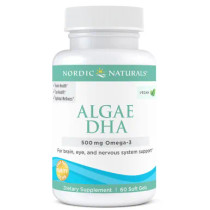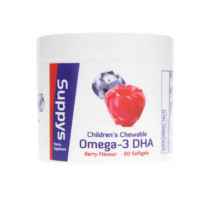DHA
DHA (docosahexaenoic acid) is an omega-3 fatty acid, typically found in the meat of cold-water fish such as mackerel, herring, tuna, halibut, salmon, cod liver, whale blubber, and seal blubber. It can also be made by algae.
DHA is commonly used for heart disease and high cholesterol. It can also help with boost memory, thinking skills, infant/ child development, eye disorders, and other conditions. Although DHA and EPA are both in fish oil, they are not the same. The difference is not only how the body can use the different forms of these fatty acids, but also the rate of which ALA converts to these two forms of Omega-3s. ALA will convert to EPA in 3 reactions, and then another 4 reactions to change EPA to DHA. There are enzymes and nutrients needed for these reactions to occur, including Vitamin B3 and B6, Magnesium, and Zinc.






